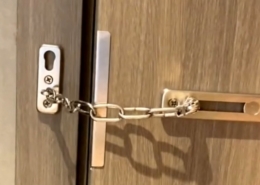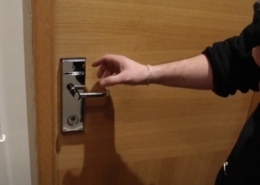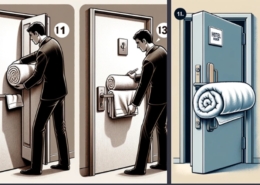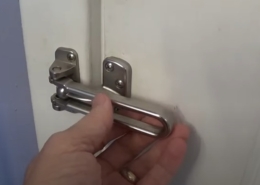Understanding the Role and Importance of Master Key in Hotel
Uncover the function and importance of the master key in hotel management. Learn how they contribute to operational efficiency and maintain the security and privacy of guests.
Introduction
In the bustling environment of a hotel, efficient management of room access is crucial. That’s where the master key system comes into play. Used by hotel staff to access any room in the building, these keys play a pivotal role in maintaining smooth operations and high service standards.
Yet, they also carry a certain level of responsibility and security considerations. This guide provides a comprehensive overview of master keys in the hotel industry, exploring their function, benefits, and the precautions necessary for their use.
What is the master key in a hotel?
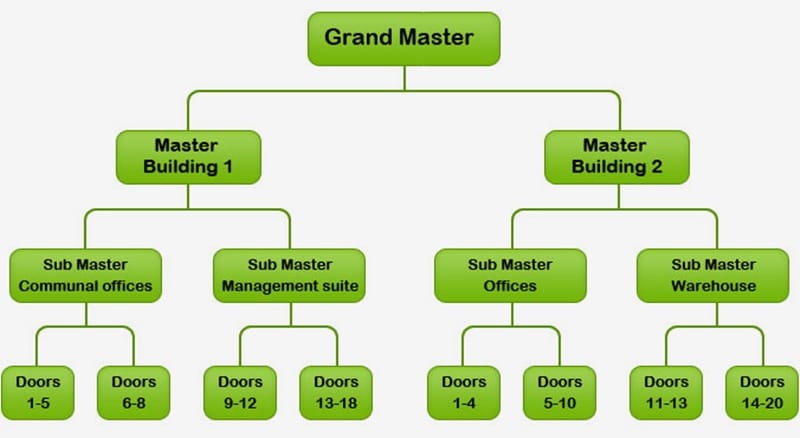
A master key in a hotel is a key that can open multiple hotel doors. This is especially useful for hotel staff, particularly cleaning and maintenance personnel, as it allows them to access any room in the hotel without carrying around many individual keys.
The master key system is based on a concept called “keyed alike” and “keyed differently.” In a building like a hotel, every individual room has its unique key (keyed differently), but a master key is created that can open all of these locks (keyed alike).
It’s important to note that the security and control of master keys are critical in a hotel. If a master key falls into the wrong hands, it can be a major security risk, as it provides access to every room. Therefore, hotels typically have strict protocols for who can carry a master key and how it will be used and stored.
What can a master key in a hotel can do?
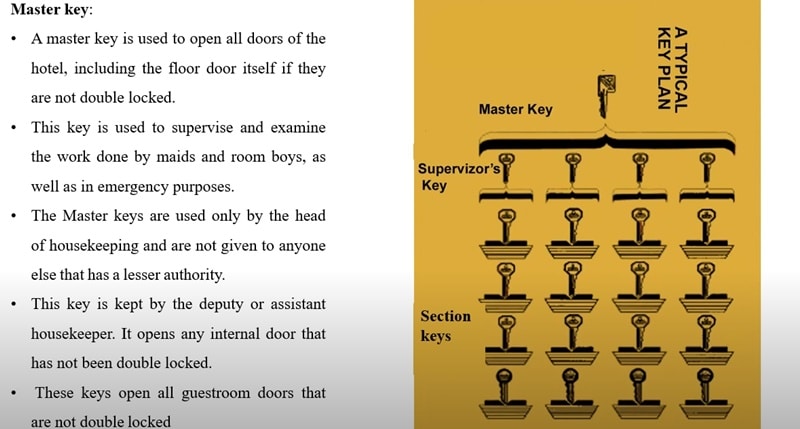
A master key in a hotel is typically used by staff and management to gain access to all or any of the rooms in the hotel. Here are some of the main things a master key can do:
- Open all rooms: The primary function of a master key is to unlock all the rooms in a hotel. This is useful for housekeeping staff who need to clean rooms, maintenance personnel who need to perform repairs, or hotel management who may need to inspect rooms.
- Access staff areas: Besides guest rooms, a master key can unlock various staff-only areas. These might include supply closets, utility rooms, offices, and other areas guests do not typically have access to.
- Bypass individual keycards: If a guest loses their keycard or if the keycard malfunctions, a master key can be used to gain access to the room.
- Emergencies: In emergencies like fires, medical emergencies, or law enforcement situations, a master key can be used to access any room in the hotel quickly.
It’s important to note that using master keys is typically strictly controlled to ensure guest privacy and safety. These keys may be tracked digitally when used, and staff are usually trained on when it is appropriate to use the master key. Some modern hotels use electronic key card lock systems, where the master “key” might be a keycard or a device that can unlock doors electronically.
How do hotel master keys work?
Hotel master keys, whether traditional or electronic, work on the concept of a master key system.
Traditional Master Key System:
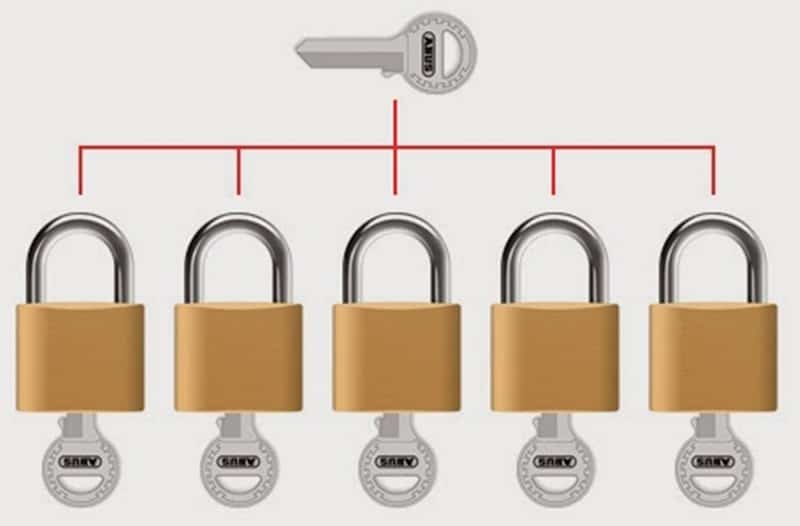
In a traditional master key system, each lock has its unique key, but all locks within the system are also designed to be opened by a single master key. This is accomplished by using locks that have two sets of pins inside them. One set matches the unique key, and the other matches the master key.
In other words, each lock is designed with two different shear lines. The shear line is the internal mechanism that allows a lock to open when the correct key is inserted. One shear line corresponds to the individual room key, while the other corresponds to the master key.
Electronic Master Key System:
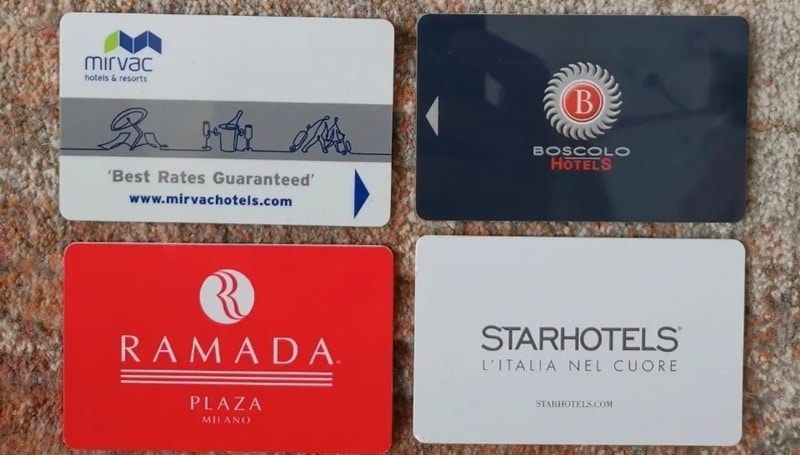
In modern hotels, electronic hotel key cards have largely replaced traditional keys. These systems use programmable key cards and electronic locks.
When a guest checks in, a hotel key card is programmed with a code to open the door to their room, this code can expire after the guest’s stay, enhancing security.
For staff, a master key card can be programmed to unlock all the rooms. This key card holds a universal code that the electronic locks recognize and respond to by unlocking.
The electronic master key system provides greater flexibility and control than traditional systems. For example, it can allow for time-based access (cleaning staff can only access rooms during certain hours), and if a key card is lost, it can be deactivated and replaced without needing to change any locks.
In both cases, the master key system allows authorized personnel to access any room in the hotel while still providing individual access to guests or occupants. However due to the potential security risks, if a master key is lost or stolen, strict protocols are usually in place to manage their use.
What are the types of master keys in the hotel?
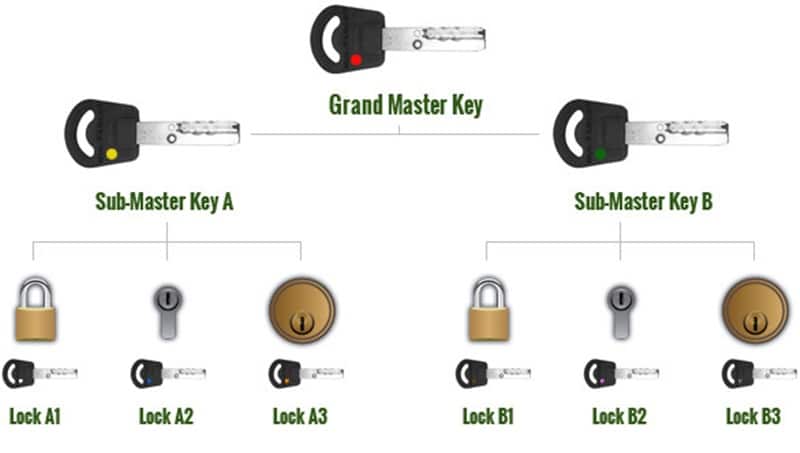
Hotels typically use a hierarchy of keys to manage access to different areas of the property. Here are some types of keys that might be found in hotels:
- Grand Master Key: This is the highest level of keying hierarchy in a master key system. A grand master key can open all the locks in the hotel. It is usually held by top-level management or security personnel. It can access every single area in the hotel, including guest rooms, service areas, administrative offices, and so on.
- Master Key: This key can open all locks within a specific system or subsystem. For example, a master key might open all the guest rooms on a certain floor or within a hotel section. In a hotel setting, these keys might be held by shift managers, head housekeepers, or maintenance supervisors.
- Sub-Master Key: These keys have access to a subset of the locks that the master key can open. For example, a sub-master key might open all the rooms on a single floor or a specific section of that floor. These keys might be held by housekeeping staff or other lower-level staff.
- Floor Master Key: This key typically opens all the rooms on a single floor. This could be considered a type of sub-master key.
- Change key (or individual key): This key can open only one specific lock. In a hotel, this would be the key given to a guest, which only opens their specific room.
- Emergency Key: This key is typically programmed to open the door and turn off the deadbolt or private function. In some systems, this key triggers an alarm to alert security personnel. Housekeeping staff might use this key under direction from management or security in case of emergencies.
- Valet Key: In some hotels, this key opens the front door of a guest room but not the connecting interior doors or certain other areas (like the minibar), allowing guests to have visitors or service deliveries without granting access to their personal belongings.
According to their responsibilities, these keys allow different levels of access for different staff members. It’s an effective way to maintain security while allowing for efficient hotel operation.
Whether a traditional or electronic key system is used, it’s important to remember that controlling and managing these keys is crucial for maintaining security in the hotel.
Master key in housekeeping
A master key in housekeeping is a key that can unlock multiple rooms within a hotel. The master key system is designed to allow authorized hotel staff, like housekeeping, to access guest rooms for cleaning, maintenance, or in case of emergencies.
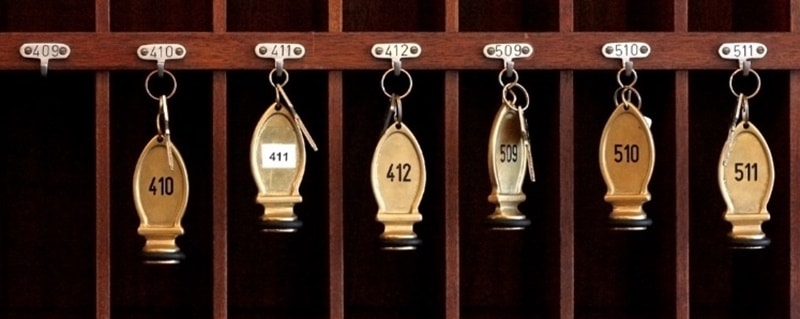
Here’s why the master key is important in housekeeping:
- Efficiency: A master key allows housekeeping staff to carry just one key that can open multiple rooms rather than many individual keys. This makes their job more efficient and manageable.
- Access for Cleaning and Maintenance: Hotel rooms must be regularly cleaned and repaired. Housekeeping staff use their master key to access these rooms when guests are absent.
- Emergency Access: In emergencies like a health crisis, fire, or security threat, a master key allows staff to access any room in the hotel quickly.
- Lost Keys: If a guest loses their key or gets locked out of their room, a master key can be used to let them in.
Despite its benefits, the master key also presents a potential security risk if it falls into the wrong hands, as it can open multiple rooms. Therefore, hotel management must have strict protocols for who can have a master key, how it should be used and stored, and what to do if it’s lost or stolen.
Master key number and master key location
Regarding a master key’s number and location, these details are typically closely guarded by a hotel or any organization using a master key system due to the security implications.
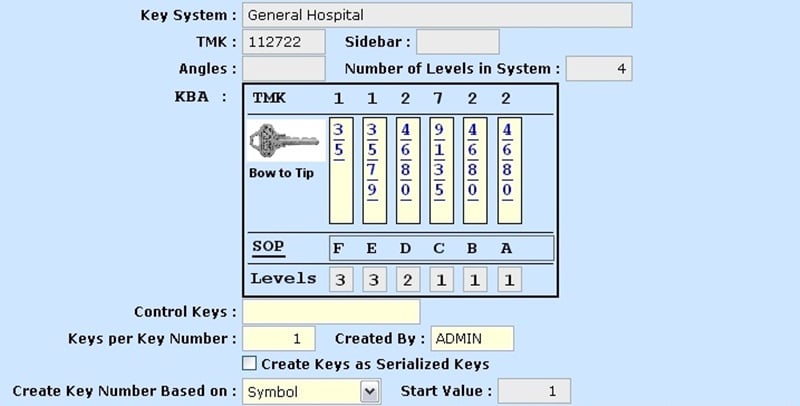
Master Key Number:
The master key number usually refers to a code that identifies a specific key within the master key system. This code could be associated with a physical or digital key card. This number helps to keep track of the keys within the system and to identify which keys have access to which areas. For security reasons, this number is usually kept confidential and is only known by authorized personnel.
Master Key Location:
The location of the master key, when not in use, is also a highly secure detail. Master keys are usually stored in a secure location, such as a locked key cabinet or a safe, when not used. Only certain staff members, typically management, would have access to this secure storage.
The master key number and location are important for maintaining the security and integrity of the master key system. If a master key were to be lost or stolen, knowing its number would help identify it and potentially change the locks or codes it was associated with. Keeping the master key in a secure location helps prevent unauthorized access.
Please note that the protocols can vary depending on the hotel or organization’s policies and the type of master key system they are using.
What is a Hotel master key hack, and how to avoid it?
Hotel master key hacking refers to the illegal practice of breaking the security of electronic hotel key systems to gain unauthorized access to rooms. This could involve exploiting vulnerabilities in the software of the key system, using stolen master keys, or creating duplicate keys.
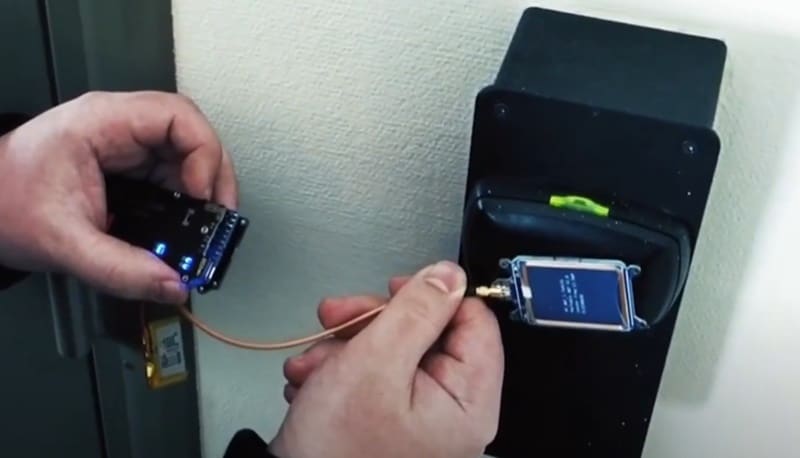
Here’s a brief explanation of how such a hack might work:
- Software vulnerabilities: Some electronic lock systems might have software vulnerabilities that a hacker could exploit. For example, there was a case where security researchers discovered a flaw in the hotel lock system software of a popular electronic lock system, allowing them to create master keys that could open any door in a building.
- Physical theft or copying: A hacker might steal a master key or find a way to duplicate it. This would give them the same access as a hotel staff member.
- Social engineering: A hacker might trick a hotel staff member into giving them a master key or a key card encoded as a master key.
To avoid such security breaches, hotels can take several steps:
- Use up-to-date security systems: Always use the latest security systems and keep software updated. New updates often include patches for known vulnerabilities.
- Regular audits: Regularly audit the key system to ensure all keys are accounted for and to check for any unusual activity.
- Strict key control: Implement strict protocols for handling master keys. Only certain staff should have access to them; they should be securely stored when not in use, and lost or stolen keys should be reported immediately.
- Staff training: Train staff in secure practices, such as not lending keys to anyone, not leaving keys unattended, and being aware of common social engineering tricks.
- Encryption and secure programming: For electronic systems, use strong encryption and secure programming practices to protect against hacking attempts.
- Replace locks if a master key is lost or stolen: If a master key is lost or stolen, consider replacing the locks, it opened, or reprogramming the electronic lock system to invalidate the old master key.
Remember, the goal is not only to prevent unauthorized access but also to maintain the trust and safety of hotel guests.
For more information about hacking hotel key cards, visit this article: Hotel Key Card Hack: How Does It Work and How to Avoid?
How to make a master key for hotel rooms?
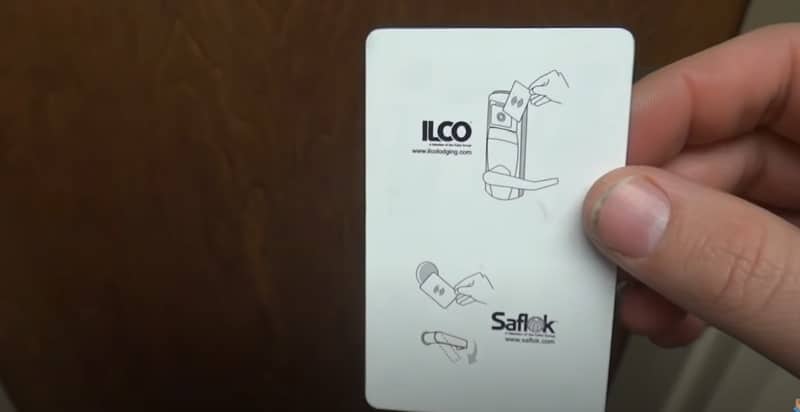
Creating a master key for hotel rooms requires knowledge of locksmithing and is generally done by professionals. The process varies depending on whether the system uses traditional or electronic key cards.
- For traditional keys, a locksmith would typically create a master key system using a technique called “pinning,” Each lock is designed with two sets of pins, one for the unique room key and another for the master key. It’s a complex process that requires expertise and an understanding of how locks and keys work.
- For electronic key card systems, the process is entirely different. When a guest checks in, a key card is programmed with a code to open the door to their room; for hotel staff, a master key card can be programmed to unlock all the rooms. The programming of these keys is usually done through proprietary hotel lock system software provided by the manufacturer of the key card system.
For more information about programming hotel key cards, please visit: How to Program Hotel Key Cards? Step-by-Step Guide.
However, it’s important to note that creating a master key without authorization is illegal and unethical. Master keys are carefully controlled by hotel management to ensure the safety and security of guests. The unauthorized creation or use of a master key is a breach of trust and a violation of privacy and could result in criminal charges.
For a professional locksmith or security personnel, it is part of their job to create, manage, and control access to master keys, always in compliance with the law and ethical guidelines.
Conclusion
Master keys are an indispensable tool in the hotel industry, providing staff with the necessary access to carry out their duties effectively while also playing a critical role in emergencies. They bring about operational efficiency, but their powerful access capabilities must be managed with strict security protocols.
It’s essential for hotel management to implement robust systems and training for master key use, balancing the convenience and efficiency they offer with the need to maintain guest security and trust.


